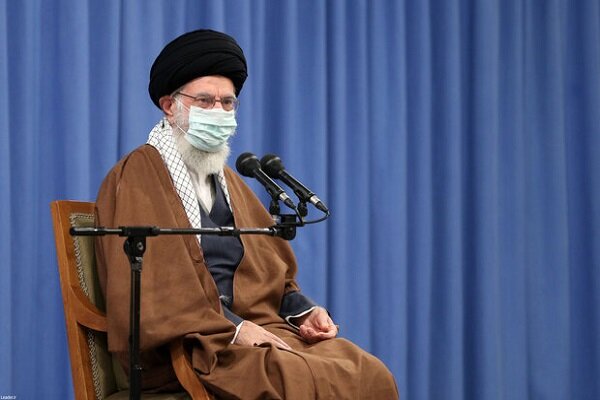Leader hails Iran election, takes jab at U.S. political bickering during presidential race

TEHRAN— Speaking on the 40th anniversary of martyrdom Ayatollah Seyed Mohammad Beheshti, which is marked as Judiciary Week, Leader of the Islamic Revolution Ayatollah Seyyed Ali Khamenei met with Judiciary chief Seyyed Ebrahim Raisi and other high-profile Judiciary officials.
The Leader began his remarks by complimenting the people of Iran on the historic June 18 election.
He stated that he may not agree with some of the views of the Guardian Council “but they acted in accordance with the law and duty.”
He then lauded the participation of the people in the elections, saying that the enemy's propaganda machine had hoped to reduce people's participation by targeting the people's living problems.
“They used as an excuse some of the incidents that happened later, such as the issue of qualification or non-qualification (of some candidates).
The Leader then pointed to the analysis put forward by some experts regarding the percentage of voter turnout, which said a minimum of 10% did not participate due to the dangers of the coronavirus pandemic.
“Due to the coronavirus pandemic, analysts predicted a low-turnout election, such as 20 or 25%. Well, under such circumstances, people participated like this. It's good, as analysts predicted 10% would not show up at the ballot boxes. If we take this issue into consideration, we will have a 60% turnout, which is good,” the Leader elaborated.
Ayatollah Khamenei then moved on to the issue of invalid votes, that some foreign media outlets tried hard to highlight with the intention to undermine the great achievement.
He said, “Some rely on invalid votes. What is the reason for that? Are invalid votes the reason for the estrangement of the people from the establishment? Not at all, not at all.
The opposite is true. This shows that people did not miff with the ballot boxes they showed up, and wrote the name of the person they wanted to be their president. It shows the people’s trust in the establishment.”
The Leader then pointed to the three live presidential debates, broadcasted live on the TV.
“A variety of opinions was observed in election debates. All of the respected candidates agreed that the country's economic problems could be resolved,” he stated.
He then noted that the presidential debates foiled the enemy’s plans, as it was the exact opposite of what enemy said.
“What the enemy wants to say is that there is no solution. They (the candidates) all agreed there is a solution, but one said my solution is right, other said my solution is right, yet they all denied existence of a dead-end. This is a very important thing,” he underlined.
The Leader lauded the positive atmosphere created after the elections, referencing in particular to the outgoing president’s visit to Raisi on its victory day, calling it “a sign of peace and tranquility that the country needs.”
“The officials and people's reactions were very well, which is one of God's gifts. Compare this with the U.S. elections.
“It is very good that the first and top officials of the country come to meet with the elected president and meet and talk and comment, to exchange views,” he remarked.
He also praised the behavior of the rival candidates who failed to win enough votes, stating that their congratulatory message to the president-elect was an act of high moral values.
“It is very good that the candidates who did not win, congratulated the candidate who won and expressed their joy and happiness. This is also a divine blessing,” he noted.
"We need to appreciate Mr. Raisi's efforts in the Judiciary”
Elsewhere in his remarks, the Leader thanked Ayatollah Raisi for his good work at the Judiciary, saying “good work” was done in this branch of government and Raisi's move in the Judiciary “was an example of what we always repeat; that is, serious, round-the-clock, hard-working, motivated work.”
The Leader then said that during Raisi’s tenure, the people's hope for the Judiciary was revived.
“The trust of the nation is a great social asset for the Islamic Republic of Iran,” he added.
The Leader then said that the process of reform in the Judiciary must continue and not be affected by the change in its leadership.
“Transformation in the true sense of the word doesn't happen in a year or two, but starting the movement in the Judiciary and adopting this kind of orientation and approach was very important. It must continue, it must not stop, and it must be intensified,” the Leader underlined.
He then referred to the Judicial Transformation Document, introduced by Raisi, saying that this document is highly important.
“It is literally operational and not a slogan. Use this document as a criterion,” he advised the Judiciary officials.
‘Terrorists are freely roaming around in streets of France’
The Leader then moved on to the topic of the 40th anniversary of martyrdom of Ayatollah Beheshti, stating that the Mojahedin-e-Khalgh (MEK) terrorists committed “a horrendous crime on a day like this, by assassinating Martyr Dr. Beheshti and 72 others. They confessed to this murder themselves.”
He criticized the European governments, with particular reference to France, which has been hosting the MEK since 1981.
“But they (MEK) walk free today in those same European countries that claim to advocate human rights, including France, which is shameful,” the Leader remarked.
He then began to harshly criticize the French government for being hypocritical, saying, “The French government and some Western governments support Mojahedin-e-Khalgh terrorists and give them an official place to talk, even in their national parliaments, yet they claim to advocate human rights. Some of the Western governments’ chutzpah is truly appalling and strange.”
Prior to the Leader’s remarks, the Judiciary chief presented a report of his two-year tenure as the Judiciary chief.
SA/PA
Leave a Comment